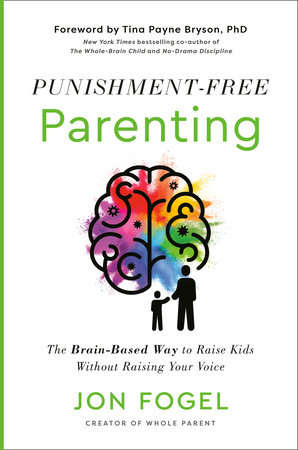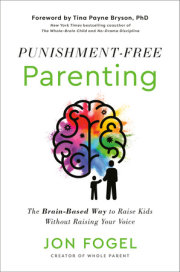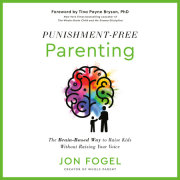1The Problem with PunishmentToo often we forget that discipline really means to teach, not to punish. A disciple is a student, not a recipient of behavioral consequences. —Daniel J. Siegel, MD, and Tina Payne Bryson, PhD
If there seems to be one prevailing myth that defines old-school parenting, it is that punishment is the most effective way to control children’s behavior and it is necessary for their development. It’s most often my opposition to punishment that stops parents in their tracks. Most of us cannot imagine a world where parents discipline children effectively without punishing them. But I’m living proof that we live in that world.
Punishment, by definition, is a
retributive action leveraged by an authority against someone who has done something that the authority believes is wrong. Punishments are used so that the offender is motivated not to offend in the future. Punishment looks back at a person’s “bad behavior” and says, “I’m going to hurt you or (at least) make you uncomfortable to make sure you don’t do that bad thing again.”
The punishments parents use have taken many forms throughout human history. Here are a few of the most common:
• Corporal punishment (spanking, whupping, paddling, pinching, or otherwise physically hurting)
• Shame and disappointment (“You are a bad kid for doing that bad thing” or “I am disappointed in you”)
• Yelling and/or scaring (
Why would you do that! I’m so mad at you right now!)
• Love withdrawal (“I’m so mad at you right now, I don’t want to be near you, go take a time-out!”)
• Removal of positive reinforcement (“I’m taking away your tablet for a week!” or “You’re grounded!”)
I’ve listed these in order of most problematic to least, but make no mistake, they are
all punishment. They all seek to harm or inconvenience a child in order to teach them a lesson.
If you want evidence as to how universal the authoritarian sentiment is that punishment is synonymous with teaching, consider how we tend to use the word “discipline.” When I say discipline, people raised in authoritarian households, that is to say most people, immediately assume that I’m talking about punishment. “I was
disciplined for taking my mom’s lipstick and writing all over the bathroom mirror” means to most people, “I was
punished for taking my mom’s lipstick and writing all over the bathroom mirror.” Ultimately, this is a misuse of the word “discipline.” To discipline, coming from ancient Greek, means “to teach,” not “to punish.” Yet we have come to think of these words as synonymous because we have been convinced that punishment is not only
an effective form of teaching, but the
most effective form of teaching.
Psychologists and mental health experts have known for more than twenty years, for example, that corporal punishment—inflicting physical pain as a punishment—doesn’t work. During the 1990s, research increasingly showed that inflicting pain on children as a means of discipline was both ineffective and had negative developmental outcomes.
That said, most parents, especially in the United States, were seemingly either unaware of this research or didn’t trust these findings. A composite of surveys conducted by the National Opinion Research Center shows that in the year 2000, U.S. parents who believed spanking was a
necessary form of discipline outnumbered those who did not nearly three to one. Six years later, the numbers had barely changed, with 72 percent of parents still convinced spanking was necessary. Even more shocking is that another six years after that, the last time the survey was conducted, the number had shifted only slightly, with a whopping 70 percent of parents
still believing that hitting children was a necessary part of parenting. Let that sink in.
In 2012, when more than twenty countries had already made spanking illegal, 70 percent of American parents still believed it was not only permissible but
necessary to spank children
. Sweden, the first country to entirely ban corporal punishment, did so in 1979, over thirty years before that final survey was conducted. They did this because of the well-documented damaging effects violent punishments have on children. Ironically, far from yielding positive long-term behavioral change, research consistently identifies that corporal punishment in childhood is linked to antisocial behavior, poor mental health, and even violence.
If you take nothing else away from this book, let it be that, at the very least, corporal punishment is never an example of effective parenting and is, in fact, harmful to children.
What we rarely admit these days is that
all punishments, including those that do not rely on physical pain, by definition, still rely on discomfort or psychological pain for the person being punished. While it seems the cultural tide is finally moving away from
corporal punishment, we don’t often consider that many other punishment techniques are also
painful.
When a parent shames, humiliates, or otherwise intentionally causes their child emotional distress (through isolation or insensitivity), the very same parts of their child’s brain that would be activated by physical pain are activated by that emotional pain. And what about grounding? That, too, creates
social pain, which the brain also processes similarly.
In fact, all punishment, at its core, is attempted discipline
by means of pain.The Impact of Punishment on Stress ResponseTo understand why punishment is not only an
unproductive way to discipline kids but is, in fact,
counterproductive, you first have to understand the body’s stress response.
You have absolutely experienced this stress response phenomenon before, and you may even know it by its street names: “fight or flight” or “survival mode.” What you might not know is that this response is triggered in our bodies by actual physiological processes.
One of the fundamental survival instincts all humans have arises from what is called the
autonomic nervous system. The autonomic nervous system, specifically the sympathetic nervous system, is the part of your body that gets you ready to fight, flee, or freeze in dangerous situations. Buried deep in the core of your brain is a small, almond-shaped neural structure called the amygdala. The amygdala’s job is to trigger automatic responses like feelings and memories.
When your body senses a threat, your amygdala triggers your autonomic nervous response to set off a cascade of hormones, chief among them epinephrine (adrenaline) and cortisol (the stress hormone), designed to get you ready to survive at all costs. Blood flow is withdrawn from the logic and reasoning centers of your brain and reallocated to your muscles. Your heart rate increases. You, in effect, stop thinking and prepare to
react. Instead of making choices based on logic or careful reasoning, you start being run by the oldest parts of your brain—what many fondly call the “lizard brain.”
When this happens, the prefrontal cortex, the part of the brain with
higher order cognitive processes—a fancy term for things like long-term decision making, moral reflection, abstract reasoning, critical thinking, and metacognition (thinking about what you’re thinking about)—all have to take a backseat. The brain is prioritizing
survival and
not rational, moral, long-term decision making. When this process is activated, it happens so fast that your body actually sends you into survival mode faster than your cognition perceives it. Consider that for a moment. Put in the simplest terms, if your amygdala sees something that it thinks could hurt you, it hops into the driver’s seat of your brain and takes control to save your life. (I know, it’s got a real hero complex, that one.) The thing is, when the amygdala’s driving, your brain isn’t good at doing much else.
The reason our brains do this is to allow us to act
without thinking. Thinking is actually pretty slow. It takes us about half a second to comprehend what our senses are telling us and then usually another half a second to make a decision about what to do. When confronted with a true threat to your life or well-being, you don’t want to sit around considering your options like you’re ordering DoorDash. You want to be able to act without thinking because a half-second lag can be the difference between life and death.
When I was seventeen and driving my 2002 Ford Focus with no antilock braking system down an icy Chicago side street coming up to a busy intersection, my lizard brain’s ability to jump in and act instinctively probably saved my life. I pumped the brakes and corrected the car as it slid, narrowly avoiding two dumpsters and sliding to a halt just in time to avoid oncoming traffic. The whole thing happened so fast, my “thinking” brain didn’t even really know what had happened. That’s just one example from my life, and I bet you could identify several times when your lizard brain kept you alive too.
But the trade-offs can be rough.
Copyright © 2025 by Jon Fogel. All rights reserved. No part of this excerpt may be reproduced or reprinted without permission in writing from the publisher.










